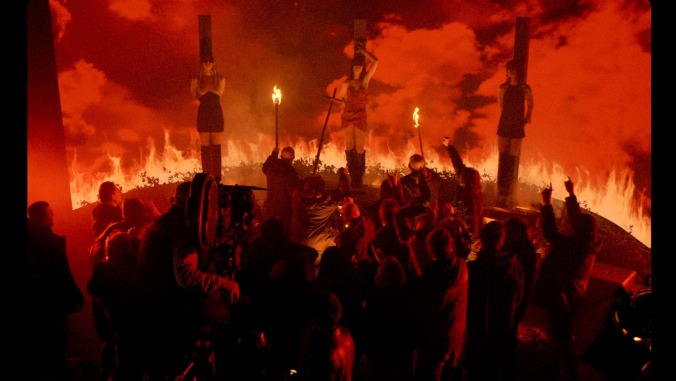With Lux Æterna, Gaspar Noé gets witchy (on Yves Saint Laurent's dime)
In which Charlotte Gainsbourg burns at the stake, and looks utterly glam doing it, of course

When Yves Saint Laurent’s creative director, Anthony Vaccarello, hired cinema’s preeminent provocateur to shoot a 15-minute fashion commercial, they were intentionally looking for trouble. Maybe even a bit of scandal. Gaspar Noé came through with Lux Æterna, a 51-minute freakout that riffs on classic cinematic depictions of witchcraft like Benjamin Christensen’s Häxan and Carl Theodor Dreyer’s Day Of Wrath before soaring way over the top with a strobe-lit finale so intense a warning label precedes the opening credits. YSL certainly got their money’s worth and then some, but is there enough here to merit a trip to the theater?
In years past, the answer would be “not unless you compulsively line up opening day for Noé’s every incitement.” But the filmmaker earned himself a new clutch of fans a few years ago with his psychedelic, techno-throbbing horror classic Climax, which, while every bit as harrowing as Irreversible, evinced genuine sympathy for the plight of its characters. It was also, for a good deal of its runtime, fun. Perhaps he’d turned a corner.
Lux Æterna kicks off with an ominous quote from Fyodor Dostoevsky. “You are all in good health, but you cannot imagine the supreme happiness an epileptic feels in the moments before a fit. I would give perhaps my whole life in exchange for a few seconds of that felicity.” This is ominous due not to the content, but to Noé’s notorious use of strobing imagery to unsettle his audience. Are we doing this again? Are we going back to the good ol’ Irreversible days, where the filmmaker sought to induce physical upset in viewers via use of low-frequency infrabass? Noé abruptly shifts from epileptic bliss to the topic of witchcraft in movies, and how Dreyer once left actor Anna Svierkier, whose character was about to be burned alive, tied to a ladder for two hours while the crew went to lunch. To hear a director who’s been accused of putting his performers too aggressively through their paces—particularly the six-day-long shooting of the rape scene in Irreversible—and marvel that Svierkier’s face “bore a real expression of horror” might be off-putting for some. But then the film launches into a freewheeling, hilariously dishy conversation between stars Béatrice Dalle and Charlotte Gainsbourg, at which point you forget the portent of the introduction and feel a measure of security.
One of the unexpected perks of collaborating with YSL is the company’s insistence that filmmakers use their brand’s celebrity endorsees. With Dalle and Gainsbourg on their roster, Noé knew straightaway who he was going to cast. The purpose of the scene is simple enough: Dalle is about to direct Gainsbourg in a scene where she is burned at the stake; their tête-à-tête, shot in split-screen, is meant as a moment of actor-director bonding to steel them for the physically and emotionally rigorous task ahead of them. Gainsbourg sips at a glass of wine while they discuss previous romantic travails. Eventually, they segue to the difficulty of navigating film production as women, which is essentially the thread that will take us to the movie’s stunning conclusion.
When they leave the comfy confines of their fireplace-lit quarters, we’re given a front-row seat to the many hindrances women confront on the set of a movie. Gainsbourg is hounded by an unctuous young filmmaker (Karl Glusman from Noé’s Love) eager to cast her in his first Hollywood production. When she rebuffs his incessant requests, he lights off on a misogynistic tirade before targeting another of the film’s beautiful young stars (Abbey Lee). Dalle, meanwhile, battles to maintain control of the scene, turning into the kind of deranged dictator we know all too well from various behind-the-scenes movies, documentaries, and books. As she loses her grip, the film’s producer (Yannick Bono) surreptitiously leaves the direction of the scene in the hands of the veteran, Godard-quoting cinematographer (Maxime Ruiz).
Before we arrive at the climactic spectacle, Noé has a bit of cheeky fun with a split-screen tracking shot that concludes with Dalle swiping one of the cameras. It’s his first go-round with the showy technique, and he adored it so much that he employed it to evidently shattering effect in his latest feature, Vortex. That he was able to do something so formally inventive and technically complex his first time out—on a five-day shoot, no less—is a testament to Noé’s thorough mastery of the medium.
Knowing how dazzling Noé can be when he’s fully engaged on a full-length movie could’ve left Lux Æterna feeling like a bit of a letdown, but it’s a freaking Yves Saint Laurent advert! If it lacks thematic profundity, well, so did David Lynch’s Calvin Klein commercials. We all know the terms of the assignment going in. Dalle and Gainsbourg give sensational performances, but their key onscreen function is to show off the nattiest duds from YSL’s 2019 collection. Cinephiles will grin at Noé’s references to Dreyer, Godard, and Ranier Werner Fassbinder, and everyone with functioning eyesight will stare agape at the closing lightshow, but the experience won’t lead to substantive post-movie conversations as Irreversible and Climax did. It may, however, compel you to price Gainsbourg’s fabulous YSL sunglasses online, in which case the film’s artistic and commercial value has been completely maximized.